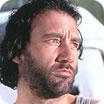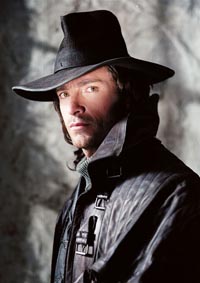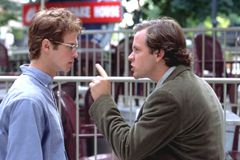|
|
 |
|
I'll Sleep When I'm Dead

Director: Mike Hodges
Writer: Trevor Preston
Starring: Clive Owen, Charlotte Rampling, Jonathan Rhys Meyers, Malcolm McDowell, Ken Stott, Jamie Foreman, Sylvia Syms,
Alexander Morton, Damian Dibben, Geoff Bell
Running time 104 minutes
Will Graham hasn't been around for over three years, having disappeared from the London scene leaving behind friends and family.
When his younger brother is found dead in his bathtub, apparently from suicide, will he return to seek vengeance?
Opening and closing on a scene of a man hitting golfballs into the sea, Mike Hodges' film is more a study of personal
conflict than a straight gangland revenge movie. Graham (Clive Owen), in attempting to escape his past, has been living in
a grubby van in the wilderness to help retain his sanity and in doing so, has tried to sever his ties and support for his
family, but these bonds remain in the background.
Unfortunately the narrative leaves so many gaping holes in this tale - we never truly get to properly know any of the
characters, which denies real sympathy for any of them.
Hodges and Owen re-team after the American success of the brilliant "Croupier" and it must be said that this
is a much poorer effort. They fall into the fatal trap of thinking that slow and sparse dialogue is enough to create an enigmatic
ambience. In particular, Owen is fine when looking moody, but not so good when given dialogue - it seems too staged, too deliberate.
The supporting cast is variable: Charlotte Rampling and Jonathan Rhys Meyer are believable and dynamic; Ken Stott and Malcolm
McDowall put in their usual stock performances, but lesser names are guilty of over-hamming their caricatures.
A reasonable enough insight into the difficulties of city living, but ultimately not enough cold hearted vengeance to
keep you interested.
________________________________________________
The Football Factory
Writer/Director: Nick Love
Cast: Danny Dyer, Frank Harper, Tamer Hassan, Roland Manookian, Dudley Sutton, Jamie Foreman, John Junkin
Football hooliganism returns to the big screen - next year we'll have diminutive Elijah Wood attempting to give it large
as a West Ham yob in "The Yank", but meantime "The Football Factory" piles in, a grim and graphic glorification
of the beautiful game's less than attractive lager and coke-fuelled underbelly - based on John King's cult 1996 novel.
The rife and hideous tribal pack mentality of this low life and middle class, morally redundant, violence-hungry, fascist
and misogynist (not got a lot going for them these guys!) ensemble is well portrayed in Nick Love's relentless adaptation
for the screen, but ultimately it's a failure. If he's set out to make a mockery of these social dinosaurs - his approach
is well wide of the mark.
Set to a tumultuous, energising and pulsating soundtrack mixing Primal Scream with the stunningly appropriate white urban
pulse rap of Mike Skinner (Streets) - this movie will have the Burberry capped neds of London at fever pitched standard and
chem. ecstasy at the glamorisation of this paen to pre-match blood culture. The only irony in this flick is the lack of on-field
football action, but the writer/helmer fails to underscore it, a bad result on the day Brian.
The ubiquitous Frank Harper (was ever an actor born for a role or what in this?), Danny Dryer and the sublime dignity
of John Junkin are three outstanding performances - but really Mr. Love - I've got four words for you...Alan Clarke "The
Firm".
Van Helsing

Screenwriter-director: Stephen Sommers
Producers: Stephen Sommers, Bob Ducsay
Director of photography: Allen Daviau
Music: Alan Silvestri
Editors: Bob Ducsay, Kelly Matsumoto
Cast:
Van Helsing: Hugh Jackman
Anna Valerious: Kate Beckinsale
Count Dracula: Richard Roxburgh
Carl: David Wenham
Frankenstein's Monster: Shuler Hensley
Aleera: Elena Anaya
Velkan: Will Kemp
Igor: Kevin J. O'Connnor
Running time: 132 minutes.
12a
Hugh Jackman takes top billing as the funky leather trench-coat wearing monster masher Van the Man, out to dash Dracula in
this pretty lame "I know how to morph and by jove I'm going to over-do it" feature.
Writer-Director Stephen Sommers seems to be more interested in trashing the villain's castle and surrounding bridges with
excessive lightning bolts (does the sun never shine in Gothland?) and creating a Young Q (of Bond fame)'s great-great-great
grandad who indulges the lead character with ridiculous weapons - making them as nifty as possible, than bothering about a
decent script.
'They don't make them like they used to' is a common criticism from many an elderly viewer when talking about contemporary
films. If the old flicks they chunter about are larger-than-life B-movies with a cheesy plot, woeful dialogue and banging
score, then Sommers' tribute to the old monster movies of yesteryear will zap them instantly back to 1936.
Reluctant action hero in-the-making Jackman (I'm sure he'd much rather be doing musicals or serious roles than prancing
about in comic-book tosh like this) plays a 19th century monster hunter who's sent on regular missions to rid the world of
its deadliest foes. His latest foray is to take down the 400-year old Count Dracula (Richard Roxburgh), who has been using
some of the other infamous monsters for his plight - notably Frankenstein, who has the power to give life to ready-to-hatch
Alien-esque Drac babies. But with the help of his sidekick Carl (David Wenham) and Anna Valerious (Kate Beckinsale), the last
of a royal family line nearly eliminated by the vampire, off he goes on a ludicrous adventure which will keep plot-hole anoraks
in orgasmic bliss for months to come.
The cinematography is reasonable, the music is pulsating but the effects and set design are pretty dire really, and Big
Shuggie just doesn't cut it in a lead role that's embarrassingly twee and utterly predictable. Also, the idea of meshing the
Frankenstein/Dracula/Wolf-Man mythologies is a good idea, but it's atrociously underachieved. Instead of being a gripping
popcorner, the flow of the movie and the characters' motives are more ho-hum than exhilirating, with the script taking fifth
place to every other facet of the movie's composition.
Additionally, just about everyone in the film seems more than a little confused as to what kind of piece they're actually
supposed to be making. Jackman plays it ultra-serious (and at times seems completely bored), Wenham is oh-so obvious as his
dim sidekick Carl complete with comedy hairstyle, and Beckinsale is abominably cliched as the lethal heroine. Richard Roxbugh
hams up his vampiric part in so camp a turn that you can't help but be amused for all the wrong reasons when this is being
marketed as a blockbuster monster movie - and he's supposed to be playing the usually-memorable all-threatening villain. Truth
of the matter is, this film is little short of rubbish.
The Company

|
 |
|
Director: Robert Altman
Cast: Neve Campbell, Malcolm McDowell, James Franco, The Joffrey Ballet of Chicago
Rated: 12a
The eponymous Company of Neve Campbell's and Robert Altman's collaboration is The Joffrey Ballet of Chicago, whose members
perform stunningly in Campbells valentine to the dance.
Campbell, who studied with the National Ballet School of Canada before turning her talents to acting, co-wrote the story
of The Company with Barbara Turner, who penned the screenplay adaptation. Sinking a huge amount of her own money into the
films production, she wisely chose Robert Altman, a master at turning the comings-and-goings of individuals in insular societies
into fascinating material, to direct this birds eye view of a year in the life of a ballet community that is a world unto
itself.
Campbell wrote a part for herself as Loretta Ry Ryan, a young dancer with a bright future, who she (also wisely) keeps
out of the limelight, apart from her romance with a chef (James Franco). In this, and any, dance company, its made abundantly
clear that there are only four stars: The director, the choreographer, the dance itself, and the troupe, which functions as
a unit, a sum far greater than its individual parts. These are people whose lives are dedicated to the pursuit of their craft,
to the exclusion of almost everything else (except drinking, it would appear here); and whose fortunes rise and fall on the
snap of an Achilles tendon; whose show goes on despite a lightning storm or an injury mid-performance.
Malcolm McDowell is the director, Alberto Antonelli, or "Mr. A," apparently modelled on Joffrey co-founder Gerald
Arpino - and perhaps another egotistical, benevolent autocrat, Mr. Altman himself. Robert Desrosiers (as himself) is the choreographer
obsessed with staging the wildly and hellishly over-the-top 'Blue Snake' ballet around Mr. A's, and the board of directors,
admonitions about "budget, budget, budget." The troupe are the young people who, when not transported by the dance,
struggle with the mundane - stretching their tight budgets by waiting on tables and sleeping 12 to a flat, coping with divorced
parents and pushy mothers, dealing with the stresses of job politics while pushing their bodies to their physical limits and
beyond.
Notable, too, is Mr. A's assistant Harriet (Barbara Robertson), a former dancer who finds reprieve alone at the barre,
taking up her gear with a sigh as the young dancers file in for their practice.
Among the highlights of the dances, many seen in rehearsal as well as in staged performance: Campbell and Domingo Rubio
performing an elegant pas de deux (Lar Lubovitch's "My Funny Valentine") in the midst of a lightning storm in Chicago's
Grant Park; Alwin Nikolais' "Tensile Involvement"; Arpino's own "Suite Saint-Saens," "Light Rain,"
and "Trinity," all still featured it is said, in the Joffrey Chicago repertoire; and the film's rivetting showpiece,
an excerpt from "White Widow," by Moses Pendleton and Cynthia Quinn, in which a solo dancer, suspended on stage
in a swing, twirls gracefully, accompanied by the ethereally-voiced Julee Cruise singing "The World Spins" (music
and lyrics by Angelo Badalamenti and David Lynch).
The whole film is lovingly tendered, but let down by the horrendous "Blue Snake" climax - make up your own mind
- is this ironic sarcasm, or just choreographed cheese on a broken biscuit of tasteless excess?
|
 |
|
|
 |
|
|
 |
|
|
|
|
Shattered Glass

Cast: Hayden Christensen, Peter Sarsgaard, ChloŽ Sevigny, Steve Zahn, Melanie Lynskey, Hank Azaria, Rosario Dawson
Director: Billy Ray
Producers: Craig Baumgarten, Marc Butan, Tove Christensen, Gaye Hirsch, Adam Merims
Screenplay: Billy Ray, based on the article by H.G. Bissinger
Cinematography: Mandy Walker
"Shattered Glass" is based on the true story of Stephen Glass, a young writer for The New Republic magazine who
fooled his editors and co-workers for years by fabricating all or parts of articles that were supposed to be non-fiction.
The film works both as a narrative about the events leading up to the discovery of Glass' deception, and as a character study
of Glass himself. This is one of the best films you'll see this year.
Hayden Christensen of Star Wars Episode II: Attack of the Clones stars as Stephen Glass. I know what you are thinking,
Christensen was less than impressive in Star Wars as Anakin Skywalker - but he is terrific in Shattered Glass. In the late
1990s, a highly influential magazine, 'The New Republic' had a staff of very young writers (average age, 26). Glass was the
youngest of the lot. Every article written by the staff was thoroughly examined for accuracy and subjected to multiple layers
of editing. Yet there was a flaw in the editing process. Fact-checkers relied too much on the notes of the reporters to verify
the accuracy of the articles. Glass fabricated his notes and nobody was the wiser.
Part of the reason Glass got away with this outrageous behaviour for so long was that he was very bright, talented and
charming, working hard to curry favour with his co-workers and bosses. An early scene in the movie shows Glass throwing a
party for his co-workers and various movers and shakers in the magazine industry. He was obsequious to his supervisors and
constantly flattered his female co-workers in order to ingratiate himself with them. All of this behaviour was part of an
elaborate scheme to manipulate everyone around him and to advance his career quickly.
The bulk of the movie is about the slow collapse of Glass' house of cards after journalists at an online publication looked
into one of Glass' stories and found out it was false. Glass continued to deny any wrongdoing, even after he was caught red-handed,
continuing to dodge evidence of wrong-doing for some time by carefully covering his tracks and manufacturing evidence to support
his claims. He even got others to help him in his cover-up. He was remarkably quick and adept at making excuses to explain
why editors were unable to confirm details in his articles, with a whole briefcase full of strategies, excuses and dodges.
He created fake web pages and had others pose as sources to confirm fake details. The schemes were elaborate, but the journalists
digging into his fake stories were even more determined to find the truth.
The story that brought down Glass - 'Hack Heaven' - was about a computer hacker who was hired as a security consultant
for a company whose computers he had hacked into. Subsequently he was able to command a very high salary and a whole load
of ridiculous perquisites. The editor of Forbes Digital Tool was furious that his reporters had been scooped on the story
and he chewed them out. Shamed, star Forbes reporter Adam Penenberg (Steve Zahn) started checking into the story and became
highly suspicious of its authenticity. Following a great deal of research, Penenberg and other Forbes reporters discovered
the story was a complete and utter fabrication. Penenberg's resulting story is considered a landmark in internet-based journalism.
Glass attempted to deflect criticism by saying he was duped by his sources - a strategy that might have worked, if he
indeed had had any actual sources. Even Penenberg was unaware of the extent of Glass' fabrications at the time his article
exposing Glass came out. It transpired that he had also fabricated all or parts of 27 of the 41 articles he had written for
The New Republic. Incredibly, he continued to evade responsibility for what he had done right up until the end. There are
certain similarities in the story of Glass and that of Bill Clinton, who was trying to cover up his affair with Monica Lewinski
at the same time Glass was in trouble. Both men never stopped in their efforts to cover up their respective wrongdoings. What
Glass did though was far more serious.
Hayden Christensen does a fantastic job in the title role of Stephen Glass. His desperation and his disingenuous relationships
with his friends and co-workers are portrayed with chilling precision. Part of the reason the film is so effective is that
we never see Glass actually doing anything involved in the cover-up, except lying. In some cases, it appears Glass himself
is unaware of what is real and what is not. We have to discover the truth about Glass through evidence, just as the journalists
investigating Glass must do. This clever plot device puts us even deeper inside the craft of journalism.
Top performances include ChloŽ Sevigny as The New Republic writer Caitlin Avey, Melanie Lynskey as colleague Amy Brand,
and Rosario Dawson as writer Andie Fox. There is one especially interesting scene between Avey and Brand in which Brand tries
to write an article in Glass' humorous, engaging style, hoping to emulate his success. "But Amy, you don't write funny",
Avey tells the crestfallen writer.
Peter Sarsgaard is highly effective in his portrayal of Chuck Lane, the magazine editor who finally fired Glass. Lane
was disliked by the staff of The New Republic, and the movie indicates that may have made it easier for him to fire Glass.
Lane replaced beloved editor Michael Kelly (superbly underplayed by the ever-reliable Hank Azaria), a few months before Glass
was fired. Kelly had staunchly defended his reporters against criticism from the magazine's publisher and was lionised by
the staff for that reason. Kelly was fired, in part, because of his anti-Clinton editorials. Kelly, now deceased (he was tragically
killed on April 3, 2003, while working as a reporter covering the Iraq war), also won the respect of the writer-director of
this film, Billy Ray, who called him "the most principled man it's ever been my good fortune to meet". Both Kelly
and Lane were of tremendous assistance to Ray in his research for the film, Ray has also been quoted as saying. Apparently
Kelly was deeply ashamed that he had never found out about Glass' deceptions while he was editor, according to the film's
production notes. Nevertheless, Kelly co-operated with Ray to help ensure the story was told correctly. I think Kelly would
be pleased that the story was told truthfully in this film. It is not sugar-coated. There is no happy ending.
However it is a very sad commentary on the damage that one unprincipled selfish man can do to the credibility of an institution.
|
|
|
 |

